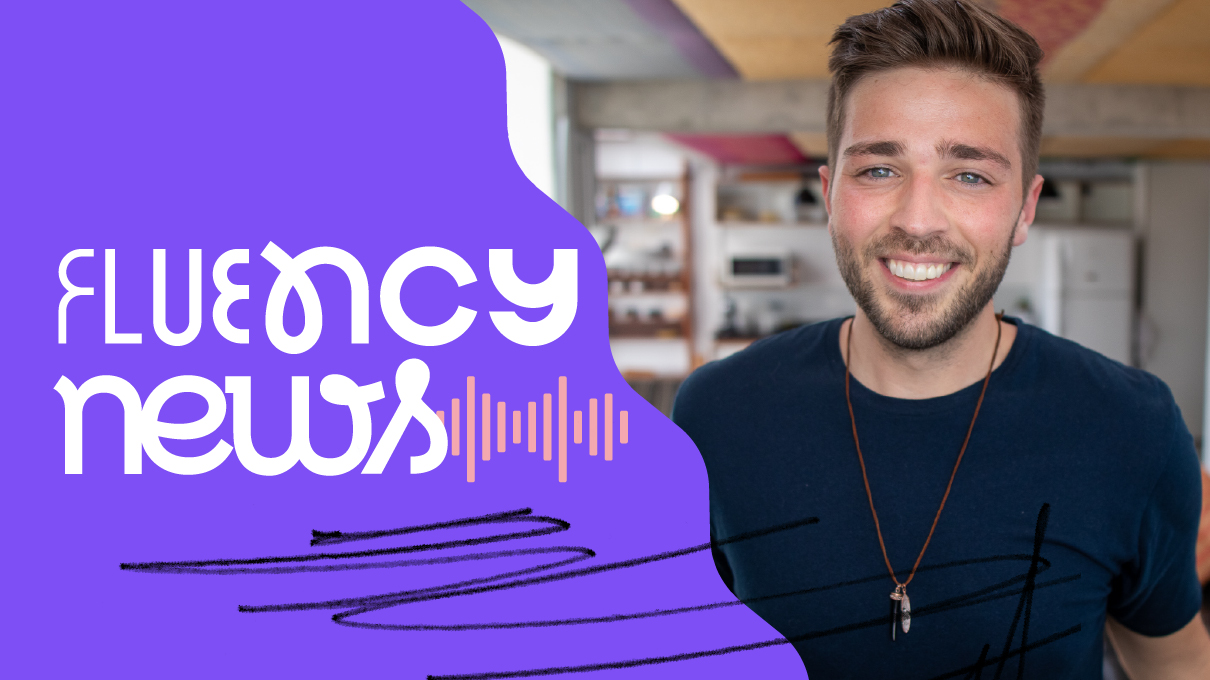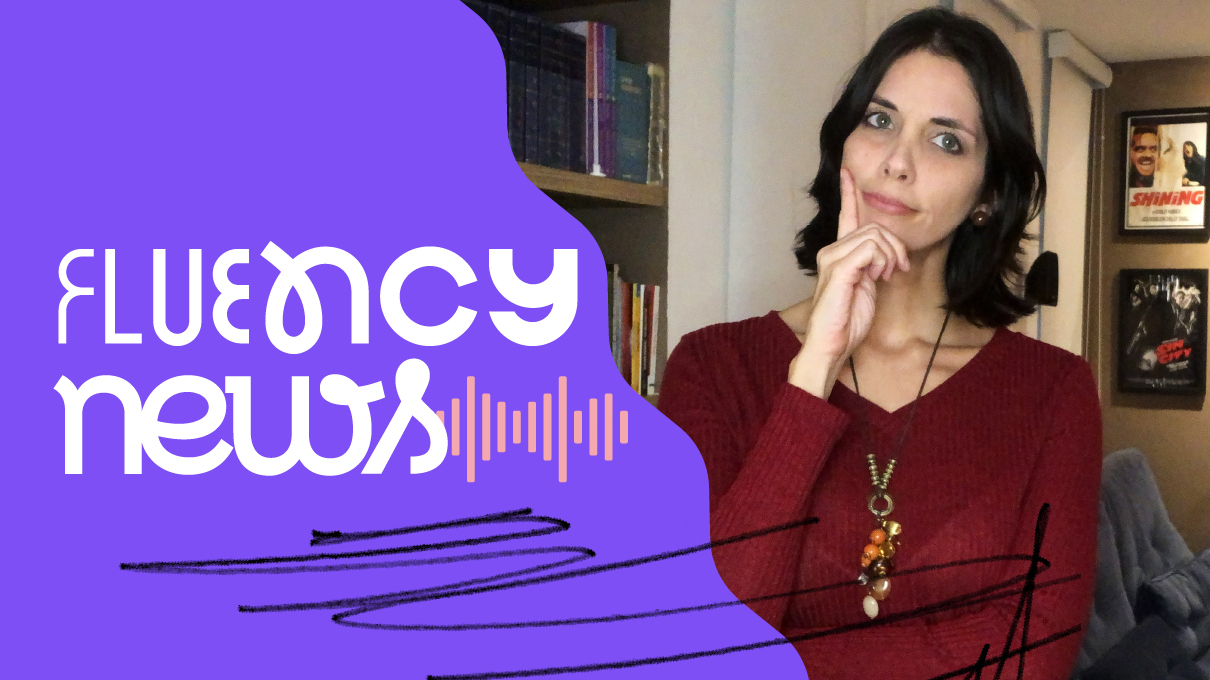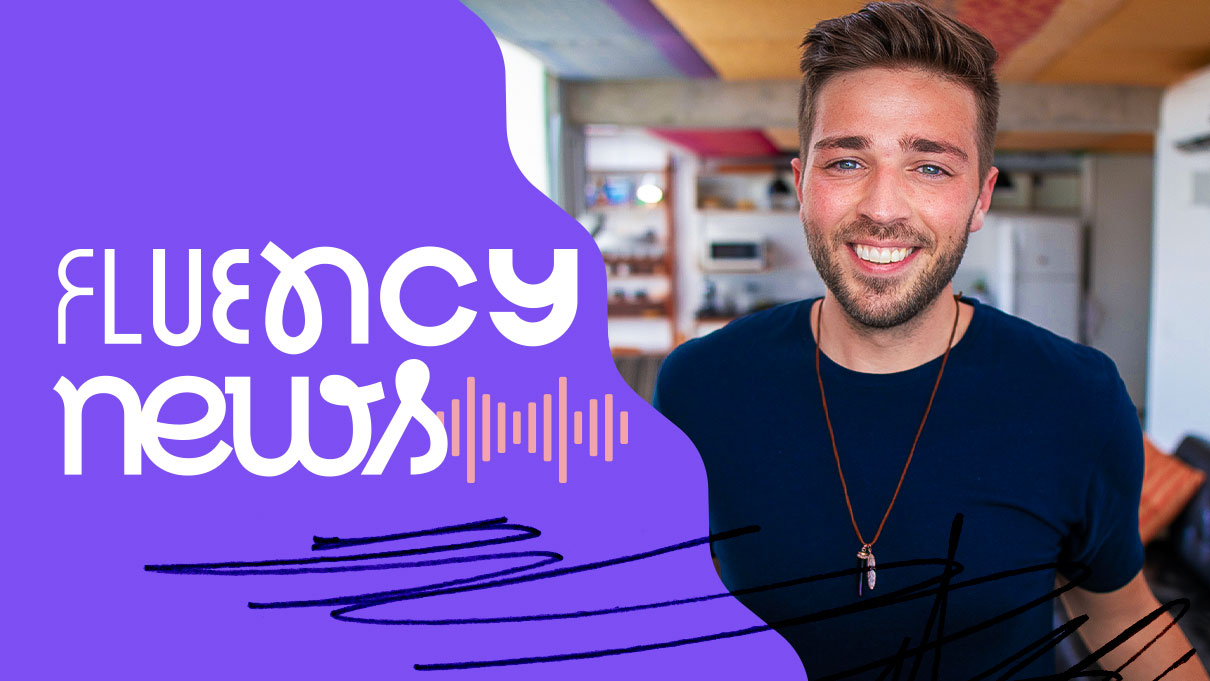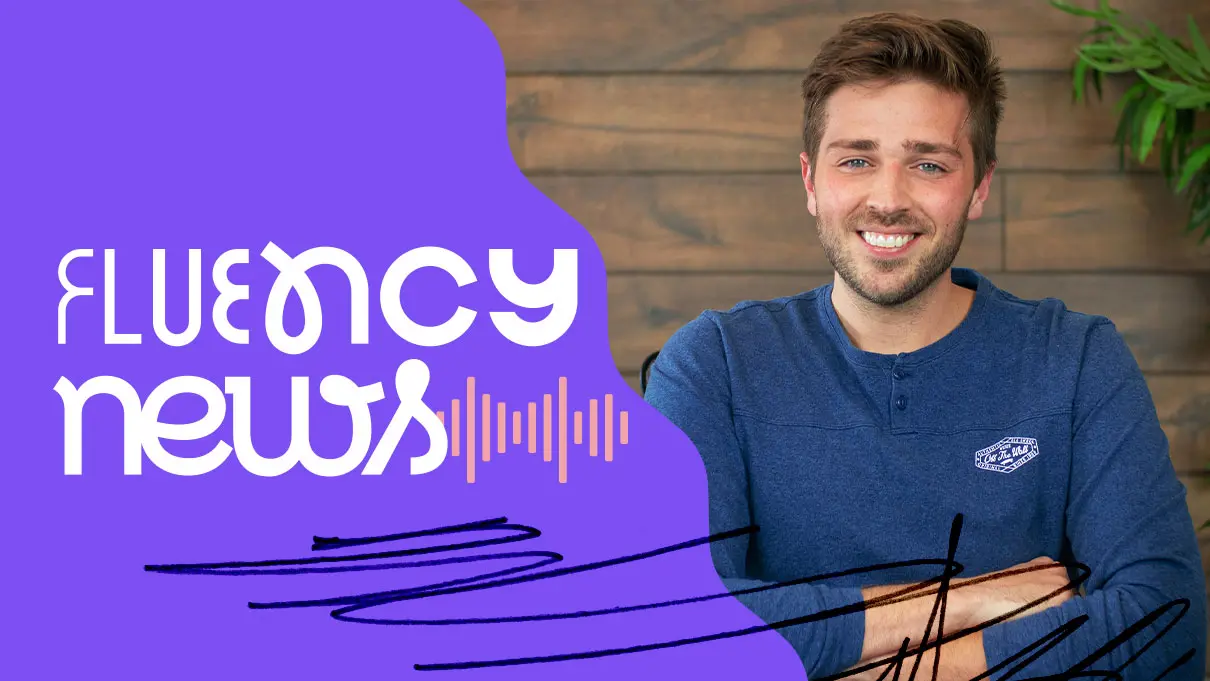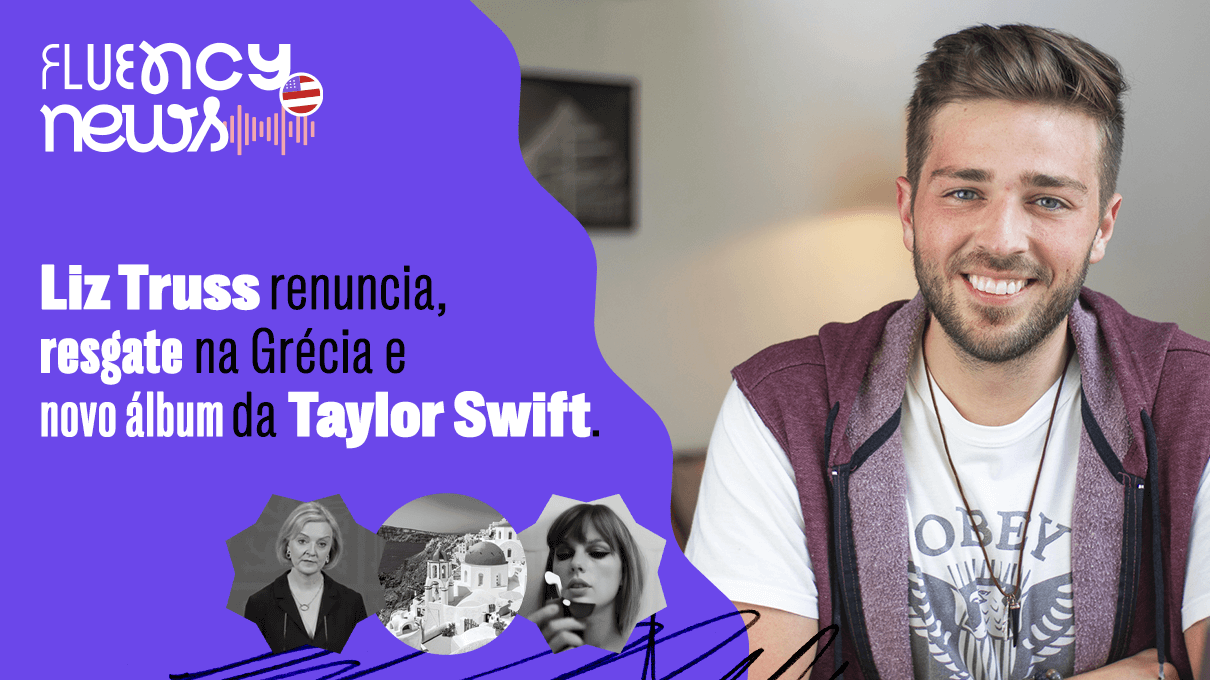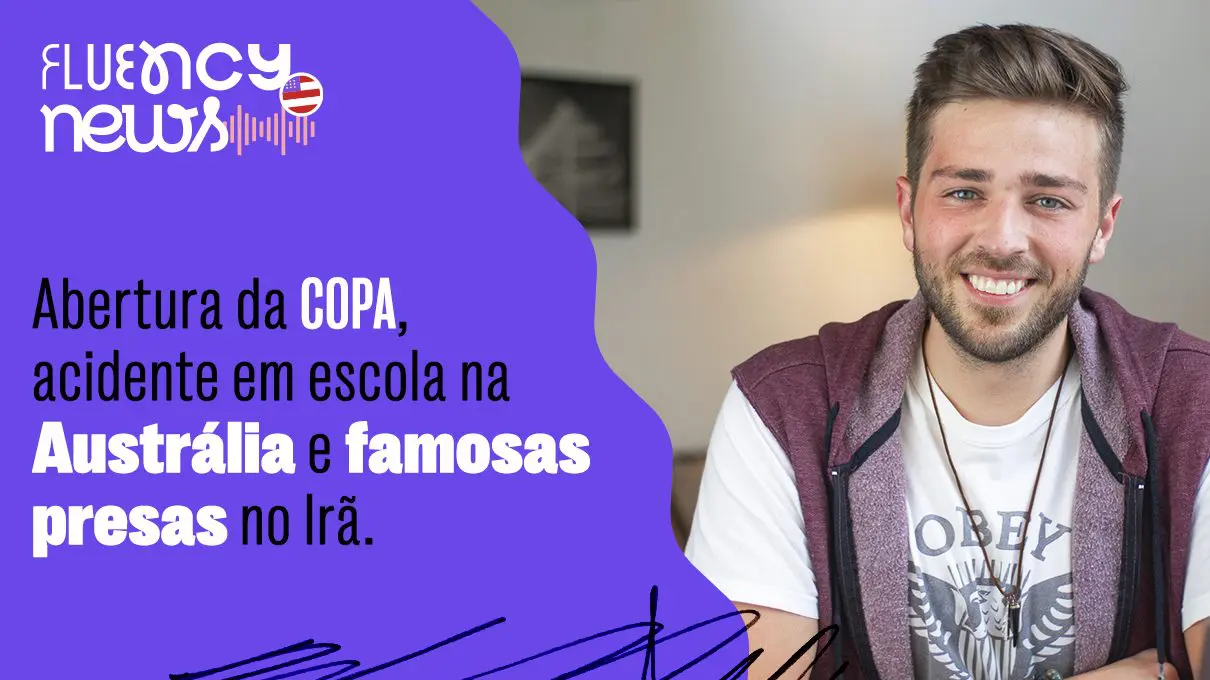Fluency News #48
Hello, everybody!
Sejam bem-vindos e bem-vindas a mais um episódio da nossa série de podcasts, o Fluency News! Aqui, você vai poder treinar a sua escuta e ficar por dentro do que está acontecendo no mundo, sempre com algumas das principais notícias da semana, tudo em inglês! Ao longo do episódio, nós também adicionamos explicações em português das coisas que achamos que precisam de mais atenção, assim você não perde nenhum detalhe!
No episódio desta semana, falamos sobre o encerramento das Olimpíadas de Tóquio, um update sobre a Simone Biles, uma reportagem sobre as novidades nas ruas de New York e, também, um pouco sobre as novidades do Instagram! Ah, falando em Instagram, não esqueça de conferir o nosso! @fluencytvingles
Toda semana, temos um novo episódio do Fluency News, não deixe de escutar!
Este episódio foi escrito por Alessandro Ladelfa.
Episode Transcript
What is up, everyone! Welcome to another episode of Fluency News. I’m Scott Lowe, and I’m very excited to have you with me. Together, we’ll see some of this week’s most relevant news, and if necessary, have some explanations in Portuguese.
Don’t forget to head over fluencytv.com. There, you’ll find the transcript of this episode, all of our sources, and free lessons in all the languages Fluency Academy teaches – which are 7! So, go to fluencytv.com to get 100% good and free content – such as videos, live streams, ebooks, other podcasts…
But, now, let’s get started:
The most unusual Olympics ended with a fitting closing ceremony: the usual speeches, performances, parades and tributes played in front of tens of thousands of empty seats. For the past weeks, the athletes performed, and records and hearts were broken.
On television around the world, it may not have looked so unusual, but, on the ground, there was an undeniable feeling of absence. An absence of cheering fans in the seats, an absence of parents embracing their medal-winning children, an absence of the buzz that takes over Olympic cities, which makes taxi drivers, hotel clerks and other residents want to eagerly talk about handball or table tennis with each other or with a visitor from another country.
Tokyo has been a warm, courteous, and resourceful host, but also a troubled one. Outside the stadium there were protests in the streets and cries of “No Olympics” as the delegates, wonks, and team members left the show at the end.
And when the Olympic cauldron was extinguished, the organizers quickly moved to a highlight reel for the Paralympics, which begin on Aug. 24th, and some fireworks. As usual, there was a segment devoted to the next Olympics host, but this year, the video peek at Paris 2024 offered not only a sense of excitement about the next Games: it also speculated that maybe there will soon be Games that will be about running and jumping rather than testing and quarantining.
Na notícia anterior, há o uso das palavras unusual e undeniable. O un- adicionado nas palavras usual (comum) e deniable (negável) serve para deixá-las com um significado negativo. Esse recurso é muito utilizado na língua inglesa e, como exemplo, se adicionarmos o un- antes da palavra happy (feliz), nós transformamos ela em negativa: unhappy significa infeliz. Assim, na notícia, o unusual significa incomum e undeniable significa inegável. Mas não são com todas as palavras que podemos usar o un- na frente para dar o sentido negativo! Dependendo do início da palavra, usamos um determinado grupo de letras para fazermos essa transformação para o negativo – como em possible para IMpossible, appear para DISappear e regular para IRregular.
Now an update to a story of Simone Biles we discussed last week. After she shared her struggles that she was suffering from the twistie, Biles won a bronze medal at the Tokyo Games in an emotional return to Olympic gymnastics competition.
Simone Biles, who is the most successful US gymnast of all time and one of the best gymnasts in the world, had not competed since last week’s team final, where she performed on the vault before saying she needed to stop to protect her mental health.
Before the start of this year’s Games, there was a chance of six possible gold medals for her in Tokyo. However, during the team final, she struggled to complete the planned number of twists in her vault and spilled out of the event. She explained afterwards that she needed to take time to focus on her mental health and that she had been suffering with the ‘twisties’ which gymnasts describe as having a mental block. But after completing a strong routine, Biles jumped up and down and hugged her rivals, registering a bronze winning score of 14.000.
Biles said her problem was that her body and her mind weren’t in sync and that’s why she couldn’t wrap her head around. She also added that it was a very hard time because she’s trained her whole life and she was feeling physically ready.
Yet, she has not confirmed her future plans in the sport following the Olympics, including the 2024 Paris Olympics. “Paris is definitely not in my mind frame because I think there are so many things that I have to work on for myself first,” she added.
Na notícia anterior, há a passagem she had been suffering with the ‘twisties’ sobre Biles. No Fluency News da semana passada, aprendemos uma construção um pouco parecida com essa chamada present perfect continuous, mas já a frase she had been suffering with the ‘twisties’ tem a formação do past perfect continuous que é usada para falarmos de uma ação que começou no passado e continuou ocorrendo até outra ação no passado acabar. A formação desse tempo verbal é feita pelo had sempre junto do been e algum verbo terminado com ing.
Por exemplo, a frase I had been working at that company for years before getting a promotion traz a ideia de que antes de eu ganhar uma promoção, eu estava trabalhando por anos na empresa. Ambas ações acabaram no passado. Na notícia, a frase Biles had been suffering with the ‘twisties’ deixa a entender que ela estava sofrendo de bloqueio mental por um certo período no passado, mas essa ação já foi finalizada. Essa formação foi usada para deixar claro, então, que Biles já está recuperada. Good news, right?
Let’s switch the topic a little: there is a growing revolution on the streets of New York, one of the world’s most congested cities. It is transforming public spaces that have long been the domain of cars and may turn out to be one of the most important legacies of the coronavirus pandemic.
Due to the pandemic, many streets that were largely reserved for one purpose (to move vehicles from Point A to Point B), now are used for much more, from increasing open space in poor and minority communities to reducing air pollution and supporting local businesses.
The pandemic pushed New York and other cities to close streets for people to exercise and to respect social distance. But what was meant as a stopgap measure, reinforced a broader movement to repurpose streets.
Caroline Flores-Oyola, 22, a college student, embraced the open street because there “you could breathe”. But, then, “people got a little too comfortable,” she said, “taking over the street for picnics and birthday parties. I felt there was an abuse of the open space because there are no rules,” she added.
There are advantages and disadvantages such as those Caroline pointed out, but what do you think about open streets?
Na notícia, há o uso do phrasal verb take over que, se traduzido ao pé da letra, não faz muito sentido, mas significa assumir o controle de algo. Por exemplo, na frase when he retired, his son took over as CEO significa quando ele se aposentou, seu filho assumiu o controle como CEO. Esse verbo é muito utilizado e, para a notícia acima, ele é de extrema importância para compreendermos a opinião da Caroline.
De início, ela mostra os pontos positivos das ruas estarem sendo usadas pelas pessoas ao invés dos carro, mas logo ela afirma people got a little too comfortable taking over the street for picnics and birthday parties e o taking over nessa frase é crucial para entendermos que logo após Caroline falar taking over, ela aponta as desvantagens.
Ok, let’s jump into our last story today which is about technology.
A lot of people who use Instagram, which was once the favorite of artists and photographers, have been looking for a new online home because of a shift towards TikTok-type videos and shopping.
In late July, hobbyist photographer and self-proclaimed “sunrise hunter” Sam Binding conducted an experiment: after visiting Somerset Lavender Farm to catch the sun peeking over the purple blossoms, he uploaded the results to both Instagram and Twitter.
Two days later, he used the apps’ built-in analytics tools to assess the impact of his shots: on Instagram, a total of 5,595 people saw his post – just over half of his 11,000 followers, but on Twitter, his post was seen by 5,611 people, despite the fact he has just 333 followers on the site.
Click on Instagram today and you will still see plenty of photos, but you’ll also be confronted with a carousel of short, vertical videos (known as “Reels”) as well as the more-than-occasional ad. Whatever happens next, it’s clear that Instagram isn’t the app it used to be. Binding added “I know a lot of photographers have taken breaks from using Instagram because they start thinking maybe their photos aren’t good enough.”
So, tell me: have you noticed any difference on Instagram? Binding has pointed out some of them, but if you’ve been using this app for a long time, I’m sure you’ve noticed others! By the way: na notícia, Binding fala sobre duas redes sociais: Instagram e Twitter. É interessante percebemos que usamos a preposição on antes de falarmos das redes sociais, como em I’ve just posted a picture ON Instagram ou I created an account ON Facebook yesterday. Did you know which preposition we use before saying the name of a social networking site?
And this is the end of this week’s episode. We will, of course, be back next week, with more relevant stories, and with updates to anything we’ve covered before.
Ah, direto a gente recebe DMs de pessoas querendo estudar aqui na Fluency Academy. Então, se você é uma dessas pessoas que querem se tornar nossos alunos, pode se inscrever agora na nossa lista de espera. É de graça e super rápido, você vai ficar por dentro de tudo sobre as próximas turmas, e terá mais chances de entrar quando abrirem novas vagas.
Então, aperte o link na descrição desse episódio e se cadastre na lista para aprender um ou vários idiomas aqui na Fluency Academy!
And remember: there’s a new episode of Fluency News every week and we’ll see you soon.
Peace out.
News:
Closing Ceremony Highlights: Tokyo Fetes Olympic Athletes With Music and Spectacle
https://www.nytimes.com/live/2021/08/08/sports/closing-ceremony-olympics-tokyo
Tokyo Olympics: Sporting drama amid a state of emergency but how will Games be remembered?
https://www.bbc.com/sport/olympics/58131750
Tokyo says goodbye to the Games with grace and sense of relief
https://www.theguardian.com/sport/2021/aug/08/tokyo-says-goodbye-to-the-games-with-grace-and-sense-of-relief
Tokyo 2020: Simone Biles wins bronze in Olympic gymnastics return
https://www.bbc.co.uk/newsround/58069910
The Pandemic Gave New York City ‘Open Streets.’ Will They Survive?
https://www.nytimes.com/2021/08/09/nyregion/open-streets-jackson-heights.html
Why Instagram’s creatives are angry about its move to video
https://www.theguardian.com/technology/2021/aug/08/instagram-artists-leaving-social-media-tiktok-shopping
Playlist















































































